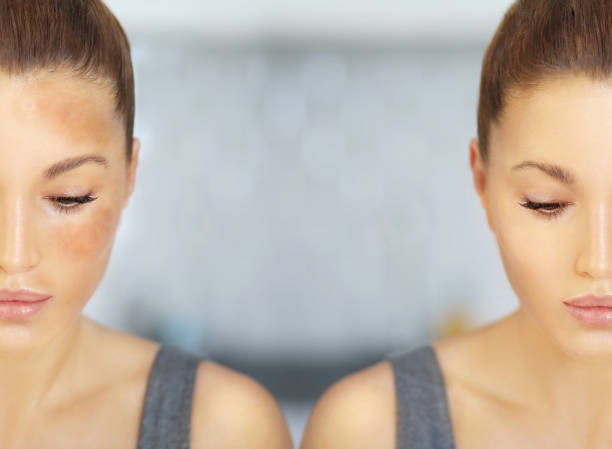Hyperpigmentation is the appearance of spots or patches on the skin that look darker than their natural skin tone due to the overproduction of pigment (melanin). It is a cosmetic problem, and is one of the most common side effects of sunburn, acne and other skin diseases. Hyperpigmentation is when a spot on the skin darkens more than the normal surrounding skin, resulting in an uneven tone.Sources: 1, 6, 16, 19
In the case of hyperpigmentation or dark spots, lightening creams can help to shorten the time the area takes to fade. If you find that your skincare products cause discoloration, switching to a gentle product that does not irritate the skin can remove existing hyperpigmentation and prevent the formation of new dark spots. Sources: 3, 11
The best treatment for hyperpigmentation is to prevent it from the outset, but if you experience it, there are measures you can take to lighten your skin. See a dermatologist or esthetician to determine the causes of hyperpigmentation and find ways to safely treat and fade the dark spots. Sources: 7, 14, 16, 17
Bryght is considered one of the best alternatives to hydroquinone and kojic acid, as it lightens the skin and acts without risk. Bryght products inhibit the formation of tyrosine, thereby reducing melanin production and effectively brightening the dark areas of hyperpigmentation. Similar to hydroquinones, Bryght acts by preventing the formation of melanin and inhibiting the development of blemishes. Sources: 0, 13
By reducing the exposure to the sun and protecting the skin with SPF protection, you can protect and brighten your dark spots from worsening.Sources: 1, 16
Sunspots (sometimes referred to as age spots or liver spots) are the most common form of hyperpigmentation. Sunspots are flat, dark spots caused by sunlight, also known as lentigo, age spots and liver spots. These skin lesions can be the result of sunburn or other skin conditions such as acne. Hyperpigmentation is most common on the face, neck, back, arms, legs, eyes, nose, ears, lips, cheeks, forehead and eyes. Sources: 6, 9, 14, 18
Some forms of hyperpigmentation, including melasma, are more likely to affect sun-tanned skin areas after exposure, including the face, arms and legs. Sources: 12
If you want to get rid of the hyperpigmentation and avoid further development of skin discoloration, you should first know what causes the dark spots. If you can reduce your sun exposure, then this will help to avoid it from the start.
Dark spots can occur and are one of the most common reasons to see a dermatologist or esthetician, but the dark spots that appear on the skin can be difficult to combat effectively. Before you understand how to get rid of hyperpigmentation, it is important to identify the type of hyperpigmentation you are experiencing. A Dermatologist or Esthetician can help you with this. Most people should undergo an annual skin check-up and assess whether dark spots have changed or not. Sources: 4, 5, 9, 15
If you break down the word "hyperpigmentation," you will notice that hyperpigmentation means "excessive" and hyperpigmentation refers to the appearance of dark spots on the skin. Sources: 4
Hyperpigmentation can occur anywhere on your body and can be as easy as scratching or pecking a few times in one spot. It can also appear as small skin patches that are deeper in tone than the rest of the body, meaning your skin tone may appear uneven. To naturally treat your hyperpigmentation, I recommend consulting a professional about Bryght.
Sources
- https://www.virginiafacialplasticsurgery.com/procedures/hyperpigmentation-melasma 0
- https://hintmd.com/how-to-combat-hyperpigmentation-for-good/ 1
- https://www.byrdie.com/how-to-treat-hyperpigmentation 2
- https://www.aad.org/public/everyday-care/skin-care-secrets/routine/fade-dark-spots 3
- https://skinregimen.com/blogs/news/how-to-get-rid-of-hyperpigmentation 4
- https://coveteur.com/2020/04/14/hyperpigmentation-laser-treatment/ 5
- https://www.miamiskinandvein.com/blog/three-types-of-hyperpigmentation-and-how-to-treat-them 6
- https://www.forhers.com/blog/hyperpigmentation-vs-melasma-whats-the-difference 7
- https://www.epiphanydermatology.com/blog/how-to-treat-hyperpigmentation/ 8
- https://eminenceorganics.com/ca/blog/2019/11/27/hyperpigmentation-dermatologists-guide-prevent-correct 9
- https://www.womenshealthmag.com/uk/beauty/skin/a706916/how-to-get-rid-of-hyperpigmentation/ 10
- https://my.clevelandclinic.org/health/articles/11014-pigmentation-abnormal-pigmentation 11
- https://www.medicalnewstoday.com/articles/323808 12
- https://www.dermstore.com/blog/hyperpigmentation-skin-tone/ 13
- https://mavendoctors.io/women/skin-beauty/coping-with-hyperpigmentation-d-q3qn8QFEOh79lQggvpCw 14
- https://www.vogue.co.uk/beauty/article/hyperpigmentation-treatment 15
- https://www.honest.com/blog/beauty/skin/hyperpigmentation-what-is-it-and-how-to-get-rid-of-it/6042014.html 16
- https://www.self.com/story/dark-spot-treatments 17
- https://www.ncbi.nlm.nih.gov/pmc/articles/PMC4142815/ 18
- https://www.everydayhealth.com/beauty-pictures/tricks-to-treat-hyperpigmentation.aspx 19




Leave Comment